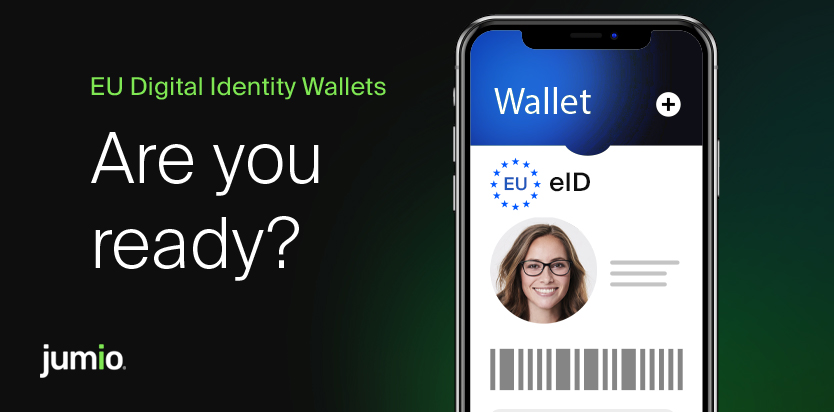
There’s a major shift happening in the way governments, businesses, and consumers establish trust with one another. With the advent of digital identity wallets, it’s becoming easier than ever to make sure the person you’re doing business with is who they say they are.
The European Union (EU) is leading the way and has passed legislation that not only standardizes the way digital identity wallets are issued — it’s mandating its member states to issue them. And in the near future, it will require many types of businesses to accept them.
But even if your business is not part of the mandate, you should be preparing now to accept EU digital wallets and electronic IDs (eIDs) or risk being left behind.
What is a digital identity wallet?
A digital identity wallet stores eIDs, proof of address documents, and other verified credentials. When a digital identity wallet is issued by a government or other trusted agency, businesses who accept them for identity verification gain a high assurance that a person is actually who they say they are.
For consumers, the main advantage of using a digital identity wallet is that you can share just the information required to verify your identity. For example, if you want to purchase liquor, you could use a digital wallet to prove your age without also sharing your home address, exact date of birth, and other personal information that the clerk would see if you handed them your driver’s license.
What is eIDAS 2.0?
eIDAS is the European Union’s legislation that oversees electronic identification (eID), authentication and trust services for electronic transactions in the EU’s internal market. eIDAS 2.0, passed in 2024, mandates that by 2026, every EU member state must provide citizens with a European Digital Identity Wallet under an officially notified scheme.
Beginning in 2027, acceptance of these wallets will become mandatory for regulated private-sector organizations including those in banking, financial services, telecommunications, healthcare, energy, and education, as well as Very Large Online Platforms (VLOPs) defined under the EU Digital Services Act.
My business isn’t part of the eIDAS mandate. Why should I worry about it?
Today’s digital world is highly convenient — for consumers and fraudsters alike. With the alarming rise in identity theft, consumers are becoming more and more concerned about protecting their identities. Once the EU member states have issued digital identity wallets to their citizens, people will insist on using them and will resist the idea of handing over all their personal information just to prove their identity.
That’s why smart businesses in online gaming, retail and other industries are already preparing to accept EU digital identity wallets. They recognize the competitive advantage of accepting these forms of identification as soon as they’re available. And many are predicting that within a few years, accepting digital identity wallets will be considered so commonplace that any business who doesn’t accept them will be left behind.
How can I prepare for EU digital identity wallets?
Each member state is issuing its own digital identity wallet. This means that businesses need to prepare their infrastructure to support each of these wallets individually. Furthermore, they need to be accredited on each wallet separately. In addition to each member state’s digital identity wallet, businesses can anticipate an influx of private wallets, which will also need to be certified against EU regulations.
Fortunately, businesses can easily avoid this overhead with Jumio. When you integrate Jumio’s web or mobile SDK into your customer onboarding process, you can accept eIDs from several EU member states and can automatically accept EU digital identity wallets as they become available. Additionally, for consumers who don’t possess eIDs or digital identity wallets, Jumio supports 5,000+ driver’s licenses, identity cards and other forms of identification from around the world.
What credentials does Jumio support?
Currently, Jumio supports eIDs from Belgium, Croatia, Cyprus, Czech Republic, Denmark, France, Italy, Latvia, Liechtenstein, Lithuania, Luxembourg, Malta, Netherlands, Poland, Portugal, and Slovenia. Jumio accepts the authoritative data issued by each EU member state. Under the current eIDAS framework, national eIDs pass verified attributes from the issuing government authority, including first name, last name, date of birth, and in some cases a verified photo.
The EU digital identity wallets can also include more credential types, including biometric data, which means a photo (or other biometric attribute) will be a standard, portable credential inside the wallet. This will enable face matching between the eID photo and a live capture — a critical step for high-assurance onboarding and authentication.
Next steps
If you do business with EU citizens, it’s important to start preparing now to accept EU digital identity wallets. Whether you’re mandated to accept these wallets in 2027 or simply want to stay ahead of your competition, Jumio can lift the burden of integration and accreditation and allow you to onboard customers with greater trust and efficiency.
To learn more, simply fill out this form, and we’ll reach out to start a conversation.